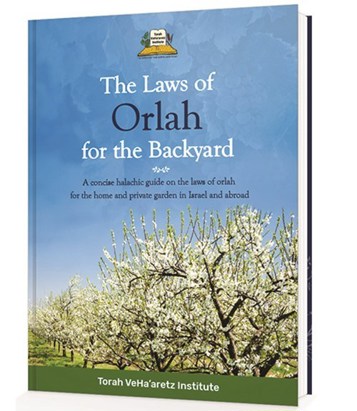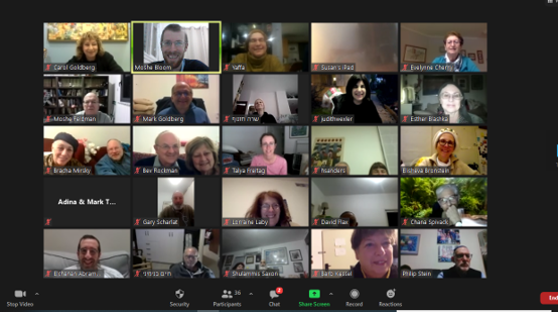
Iyar 5781, Issue no. 16
Back Again
After more than a year's break, we are happy to send you our monthly newsletter, Bikurim issue No. 16 for the month of Iyar.
Shemitah is approaching in gigantic steps, and now is the time to start preparing for this important year.
To order a tour or a zoom or a face to face lecture, for halachic questions, to schedule a Shemitah tour, call 052-8903729 or email: h.moshe@toraland.org.il
New Book in English – Hilchot Orlah!
The Laws of Orlah for the Backyard
A concise halachic guide on the laws of orlah for the home and private garden in Israel and abroad. The rulings in this book are based on articles written by rabbis of Torah VeHa'aretz Institute and the rulings of Rabbi Yaakov Ariel, the institute's president.
Authors: Rabbi Dr. Yoel Friedemann, Rabbi Moshe Bloom
Only 40 ₪, shipping included!
Order now: on our new online bookshop,
08-684-7325, machon@toraland.org.il
For a preview with contents, click here.
Coming Soon - Shemitah Zoom Lecture
How to handle kedushat shevi'it fruits and vegetables
during and after Shemitah?
Tuesday, May 25, 2021, 14 Iyar 5781, 8 - 9:15 pm
Join, for free (see Sponsorships below) the 3rd Zoom shiur with Rabbi Moshe Bloom, Educational Director at Machon Torah VeHa'aretz as we continue to learn about and prepare for Shemitah.
To reserve your spaces and to submit questions for this shiur send an email to: shemitahevent@gmail.com. Please supply your name(s), telephone number(s), and email address. You will receive an email message confirming your participation in the shiur.
Sponsorships: Machon Torah VeHa'aretz charges 350nis per shiur. While there is ‘“no fee'' to join this shiur, please consider being a full or partial sponsor (minimum 100nis) to celebrate a Simcha, bring a Refuah Sheleima, or commemorate a Yahrzeit.
For more information, contact Mark Goldberg 054-2192873 or by
email: markgoldbergpmp@gmail.com.
Sponsors’ names and occasions will be announced at the beginning of the Zoom session.
Shemitah Lectures Delivered
In the last few months, we gave zoom lessons to various groups. To watch some of these lectures, see here.

Hilchot Shemitah Book
We are at the last steps of our Shemitah Guide. The chapters are already published on our website, here.
Professional Guide, Preparing Ornamental Gardens for the Shemitah year
This guide was written for professional and private gardeners; what is true for farmers is not necessarily true for gardeners. Farmers deal with food—vital staples for basic sustenance; gardeners are involved in matters perceived as luxuries. For this reason, halachic rulings for farmers differ from rulings for gardeners. Here we do not search for the lenient opinions to rely on in extenuating circumstances; rather we looking for the conventional, straightforward halachic guidelines—whether stringent or lenient. This is where the differences in halachic guidelines stem from.
For the full guide, Available as well as a colored PDF version, click here.
Q&A - Do leaves have shemitah sanctity?
Question
During the normal gardening season, I collect fallen pine needles, leaves, twigs and branches from the wooded areas and walkways around my community. I use the pine needles for mulch, which I place on top of my raised vegetable beds. I shred fallen leaves and store them in a composter bin or plastic bags for six months to two years; they then become leaf mold, which I use as a soil amendment. I turn branches and twigs into woodchips (with a wood chipper) and place them on pathways between the raised beds.
May I continue collecting these items, provided I only store them during shemitah? May I continue applying woodchips to the pathways during shemitah, as I am not growing food there?
Answer
Shemitah sanctity applies only to crops intended for human food or animal fodder and certain specific needs (ex. herbs, cosmetics, and paint). Wood for heating is not sacred. For most fruit trees, their leaves, branches, and needles are not earmarked for any particular use—so they do not have shemitah sanctity (seeds and peels may be sacred, though). This is similar to orlah, where the fruit is forbidden but other tree parts (leaves, branches, flowers) may be benefited from throughout the first three years.
For this reason, needles, leaves, and branches are not sacred and may be used for any purpose, including compost. Moreover, since non-agricultural activities are permitted during shemitah, you may place woodchips on your garden pathways. It is possible to create compost during the shemitah year, but it should not be used as fertilizer during shemitah. Thus, the soil should be adequately fertilized prior to shemitah.
Yishar ko'ach—continue recycling and making Israel clean and beautiful!
